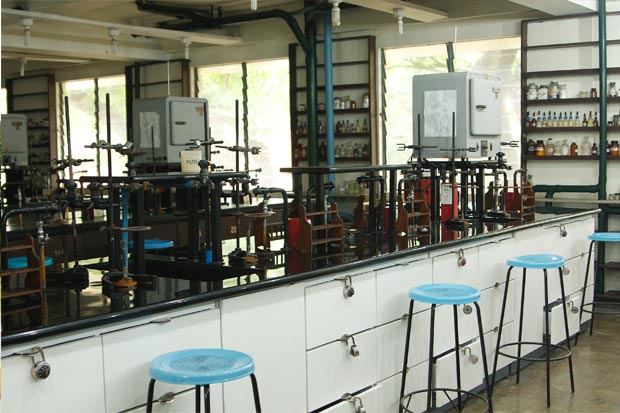
Scientific empowerment. In addition to the traditional laboratories such as this now utilized by the Ateneo, a new systems design and testing lab has been made that will encourage students to further develop their technological skills. Photo By Pia B. Guballa.
IN ITS efforts to keep up with the latest advances in science and technology, the School of Science and Engineering (SOSE) has established the country’s first Systems Design and Training Laboratory, courtesy of a $45,000 donation (about P1.9 million) from National Instruments (NI)—a US-based test and measurement company.
Established under the Planet NI initiative, the laboratory is equipped with 10 sets of the latest graphical programming software and computer-based measurement hardware. It is located at CTC-315 and was inaugurated last April 29.
The facilities will be used for teaching the LabVIEW Basic 1 and Basic 2 courses. LabVIEW is a graphical programming environment used by engineers to develop systems using intuitive graphical icons and wires.
According to NI Field Sales Engineer Jack Aguilar, the Ateneo lab is unique because it has teaching platforms; other universities are only equipped with learning platforms.
The Ateneo also provided $12,551.43 (around P540,000) to the grant.
‘Experiential learning’
In his acceptance of the grant, Vice President for the Loyola Schools John Paul Vergara said that the NI donation increases SOSE’s capability to meet students’ needs.
“Here at the Ateneo, we place much importance on experiential learning for our students and on finding ways to apply research to real world problems and situations,” he said.
“These instruments are a big help to our students and [small and medium enterprises] (SMEs) who require robust systems in order [to] deploy their applications quickly,” said Nathaniel Libatique, Ph.D., Department of Electronics, Computer and Communications Engineering Chair.
He cited some of the system’s practical applications, such as for developing interfaces for low-cost health instruments and for designing servers that can monitor dissolved oxygen levels in lakes, among others.
Open to SMEs, other universities
Aside from its use in student research, the lab can also be used by SMEs and teachers from other universities.
Libatique said that the laboratory is not for use in tuition-based courses. Instead, it is available for intensive three- to four-day seminars open to all. Five to ten trainees from other universities and SMEs will be accepted for training four times a year.
The lab is under the Ateneo Innovation Center, the school’s external face to engaging communities and companies.
Chandra Nair, Managing Director of NI-ASEAN, said that the grant allows SMEs to develop and test systems and prototypes. This part of the process is often expensive; under the NI lab, the costs are offset. Once the SME becomes profit-ventured, a fee may be charged for the use of the systems.
Planet NI’s first outreach program
Aside from the laboratory, Planet NI’s partnership with Ateneo also marks the former’s first outreach program with a Philippine academic institution.
Nair said in his inauguration speech that they wanted a partner that aligns with their social aspect of empowering engineers. “We did not want to give something away for free,” he said. “We wanted to make sure that we work with a university which understands our technology.”
Senior Vice President for Sales and Marketing Pete Zogas said Planet NI’s vision is to empower engineers in developing countries to achieve economic prosperity through access to technology.
Something new to use, to learn
As the grant is relatively recent, most ECCE students are still unfamiliar with the lab. For Ateneo Electronics and Computer Engineering Society (Aeces) Secretary General Bryan Lao, the creation of a new lab looks “promising.”
“It seems that Ateneo is doing its best to adapt to the changes,” he said.
Aeces President Kevin Paltao hopes that the lab would not just be “for show” and would actually be used by the students.
He also said that the addition of a new laboratory may pave the way for renovations to existing ECCE labs, which lack equipment or do not function properly.
With reports from Katerina D. Francisco







